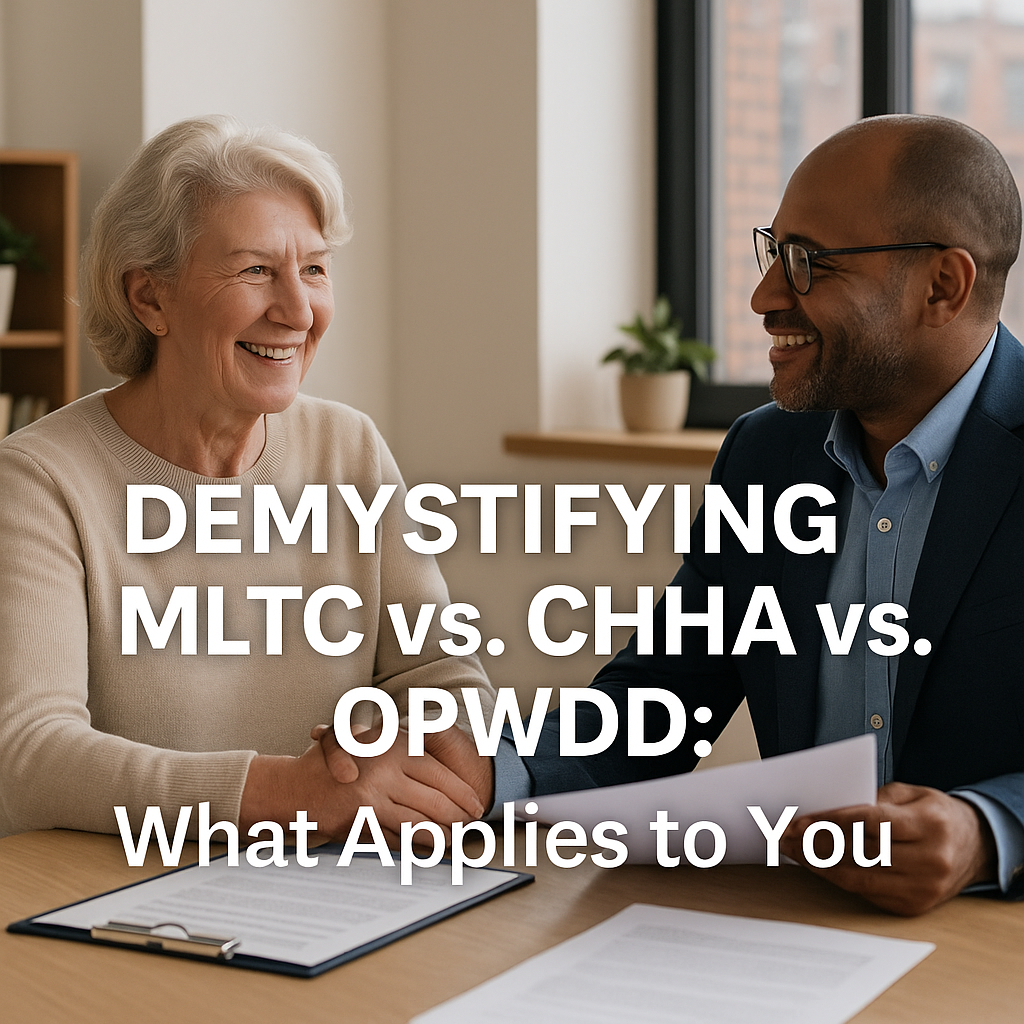Navigating New York’s long-term care and disability support programs can feel like trying to read a subway map in a blackout—confusing, stressful, and overwhelming. If you’ve heard terms like MLTC, CHHA, and OPWDD but aren’t sure which applies to you or your loved one, you’re not alone. Each program has a specific purpose, eligibility criteria, and type of care it covers—and understanding them could make all the difference in getting the right support.
Table of Content
1.Why MLTC Providers Deny Care—And How to Push Back
2.What Is CHHA (Certified Home Health Agency)?
3. What Is OPWDD (Office for People With Developmental Disabilities)?
4.Key Differences at a Glance
5.Real-World Scenarios in NYC
6.Why Legal Help Can Make a Difference
7.How SecureSafer Helps
8.Taking the Next Step
What Is MLTC (Managed Long Term Care)?
Managed Long Term Care, or MLTC, is a New York State Medicaid program designed for people who have chronic illnesses or disabilities and need long-term care services at home or in a community setting. The goal is to help individuals remain in their homes and avoid unnecessary nursing home placement. Services may include home health aides, nursing care, adult day health care, and certain medical supplies. According to the New York State Department of Health (health.ny.gov), enrollment typically requires that the person is eligible for Medicaid, needs long-term care for more than 120 days, and is over age 21.
Unlike traditional fee-for-service Medicaid, MLTC is delivered through plans that coordinate your care. In NYC, this can make navigating services easier, but it also means you’ll need to choose and enroll in a specific plan.
What Is CHHA (Certified Home Health Agency)?
A Certified Home Health Agency, or CHHA, provides short-term, medically necessary home health care under the direction of a physician. Services are typically covered by Medicare, Medicaid, or private insurance. According to Medicare.gov, CHHA care is usually prescribed after a hospitalization, surgery, or a sudden change in medical condition.
ADVERTISEMENT
While MLTC covers ongoing, long-term needs, CHHA focuses on skilled care—like nursing visits, physical therapy, or speech therapy—for a set period. In NYC, CHHA services are often a stepping stone, helping patients recover at home before transitioning to less intensive care.
What Is OPWDD (Office for People With Developmental Disabilities)?
The Office for People With Developmental Disabilities, or OPWDD, provides services for New Yorkers with developmental disabilities such as autism, Down syndrome, cerebral palsy, and other neurological conditions. OPWDD supports are not short-term medical services—they are long-term, life planning, and skill-building programs that can include housing, job training, and community integration.
Eligibility is based on diagnosis and functional limitations. The New York State Office for People With Developmental Disabilities (opwdd.ny.gov) manages these programs, and applying requires documented proof of disability, often starting with an intake and evaluation process.
Key Differences at a Glance
While all three programs help New Yorkers access care, they serve different needs:
- MLTC: Long-term care management for Medicaid-eligible adults with chronic illness or disability.
- CHHA: Short-term skilled medical care at home, often post-hospitalization.
- OPWDD: Lifelong supports for individuals with developmental disabilities.
Real-World Scenarios in NYC
- Case 1: Maria, 76, living in Queens, has arthritis and needs daily help bathing, dressing, and managing medications. She qualifies for MLTC through Medicaid.
- Case 2: James, 62, in the Bronx, just had knee replacement surgery. His doctor prescribes CHHA services so a nurse and therapist can help him recover at home.
- Case 3: Aisha, 10, from Brooklyn, has autism. Her family applies for OPWDD services to access therapy, school supports, and future planning.
How SecureSafer Can Help
At SecureSafer Insurance Consulting, we guide NYC residents through the maze of healthcare programs. Whether you need help applying for MLTC, finding a CHHA, or navigating the OPWDD eligibility process, we provide clear, step-by-step assistance tailored to your family’s needs.
ADVERTISEMENT
We stay updated on Medicaid, Medicare, and NYDFS regulations so that your applications are accurate, compliant, and stress-free. Our goal is to make the process simpler—because you already have enough to think about.
Taking the Next Step
If you’re unsure which program applies to your situation, start by making a list of your—or your loved one’s—daily needs, medical conditions, and long-term goals. Then, speak to a trusted advisor or agency like SecureSafer. Choosing the right program is about matching eligibility, benefits, and personal goals—not just picking the first option you hear about.
Compliance Note:
This article is for informational purposes only and is not a guarantee of benefits, eligibility, or results. Program details may change. For official program information, visit Medicare.gov, New York State Department of Health, and New York State Department of Financial Services.
| Need Help Now? Don’t Wait. ✅ Call our SecureSafer team directly at SecureSafer.com or call (646) 444-2020 ✅ Request a policy review or switch evaluation today. |
ADVERTISEMENT

